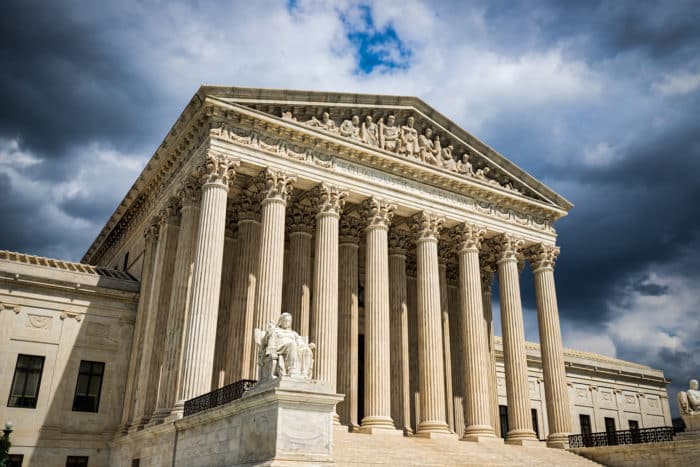
(Photo Credit: William Chizek/Depositphotos)
What was your phone like 30 years ago? Were you even born 30 years ago?
It’s been three decades since the piece of legislation known as the Telephone Consumer Protection Act (TCPA) became law, and it’s clearly poised to get a lot of attention in 2021 because of another year of Supreme Court activity.
Insiders and court watchers know what’s going on with the statute, which was written in 1991 as a way to protect consumers’ phones and fax machines from overzealous marketers. Back then cell phones were still roughly the same size as our new little dog Maggie.
Most Americans know about the “Do Not Call List,” which was established through the legislation, but maybe don’t know that TCPA is the only federal law governing cell phones.
It’s true. So, even if this is your first time hearing about the TCPA, you should pay attention to the Supreme Court’s ruling on the law. It should come later this year. We here at Top Class Actions are watching with interest to see what develops, but mostly so we can tune our dials and keep serving the TCA community in the best way possible.
To catch you up, the Supreme Court heard oral arguments on a case called Facebook vs. Duguid in December. The case is about robocalls, or whether the definition of an “automatic telephone dialing system” in the statute constitutes any device that can “store” and “automatically dial” telephone numbers, even if the device does not “us[e] a random or sequential number generator,” according to SCOTUSblog.
Basically, Noah Duguid sued Facebook in 2014 over automated text messages the company sent him, but Facebook says it didn’t use an autodialer, according to the law. Facebook, the big multibillion-dollar international company felt confident enough, (and well funded enough) to push its case.
Facebook might be correct, on a technicality, but it means the Supreme Court will have to decide between a couple of tough options because the law is so antiquated. On one extreme, they may decide to agree with Facebook; but that opens up consumers to a flood of automated text messages hitting their phones in the near future. On the other extreme lies the possibility that the Supremes could create a situation where normal cell phone activity — like using auto-reply for a text message — becomes technically illegal.
It’s a big mess. If you want to take a deep dive into the whole issue, the guys over at TCPA World do a great job keeping up with every twist and turn. If you want to see if you qualify for a case or a settlement check here.
So what does this mean for TCPA Class Actions Lawsuits as a whole? Probably a lot.
Literally, thousands of TCPA cases have been filed since I started Top Class Actions, and hundreds of millions of dollars have been spent resolving them. The cases generally follow a similar pattern. Plaintiffs’ lawyers file lawsuits against companies that send text messages or robocalls through automatic telephone dialing systems to people who didn’t give their consent to be communicated with in that way.
Basically phone spam. It’s suuuper annoying, which is something that has not changed since 1991.
So what happens if auto-dialers get taken out of the equation? One theory is that if TCPA’s teeth are dulled on the federal level, the cases will slide into state courts, where similar laws remain powerful. Another is that the suits may simply focus more on “Do Not Call List” offenses instead of automatic dialer offenses.
Whichever way the Supreme Court comes down, it’s a good bet that the legal industry that’s built up around TCPA cases will have a bit of turbulence.
Turbulence usually is not that bad though. It can be scary, but it’s just a bumpy ride, and TCPA cases are going to continue.
Top Class Actions can help no matter which way it goes.
We’ve been writing about TCPA cases and settlements since 2008, and we’ve helped find many plaintiffs and claimants along the way.
Our vast and engaged audience at Top Class Actions stays in tune with changes in laws related to class action lawsuits. We help educate as many consumers as we can about their rights, and when those rights are altered.
Suffice it to say, Top Class Actions’ readers will be there no matter which way the Supreme Court decides.
– Scott Hardy
Scott Hardy is President and CEO of Top Class Actions.















26 thoughts onTCA and TCPA: Ready and Waiting for Supreme Changes | Scott Hardy
Please add me the solar company, spam, wrong number calls, late into the night. Home and cell phones
Please Add Me
I get calls for student loans & I have never had any student loans. I get calls for mortgages & refinancing yet I do not have a mortgage. The third biggest offender is insurance solicitations.
Add me I have to unplug my phone because I can’t see no peace for scam calls and I’m on the do not call list but they still call. We need help.
It is cray how many calls I get sick of it
Please add me